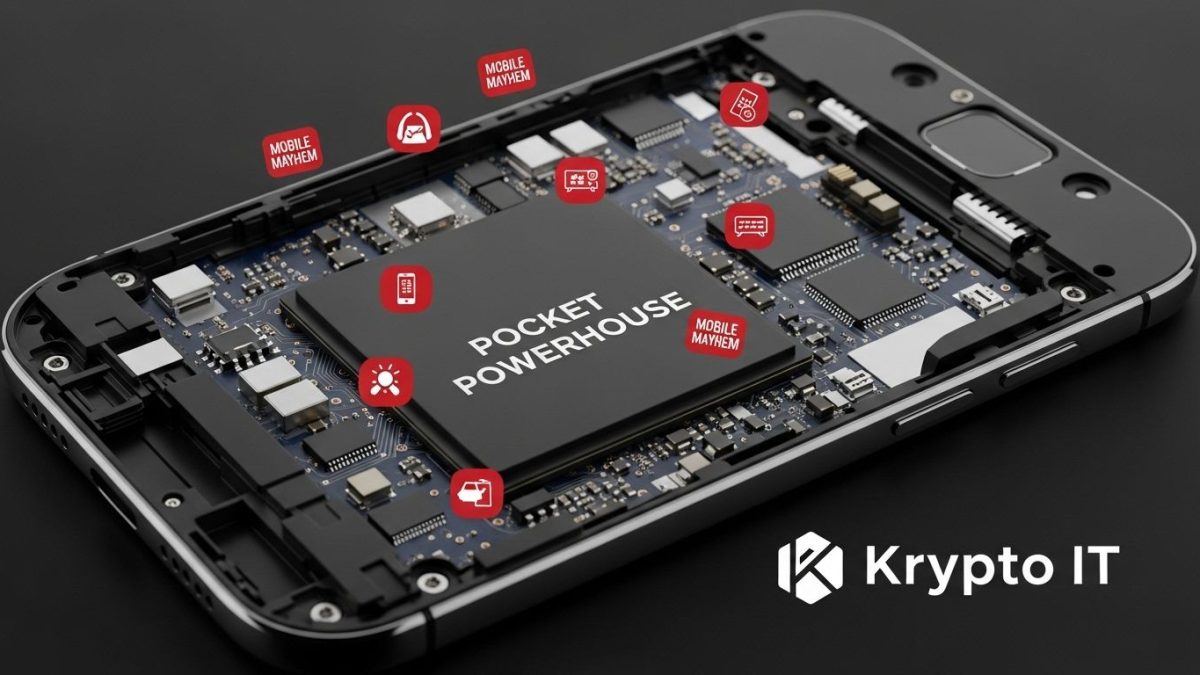
Your Strongest & Weakest Link: The Human Element
June 12, 2025
Protecting the Unseen: IoT & OT Security
June 15, 2025Navigating the Rising Tide of Smartphone Cybersecurity Threats
Our smartphones have become indispensable tools for both personal and professional life. We conduct business, manage finances, communicate with loved ones, and store a wealth of sensitive information – all within these pocket-sized powerhouses. However, this convenience comes at a cost: a rapidly escalating mobile security crisis. For Small and Medium-sized Businesses (SMBs) in Houston, especially those embracing remote or hybrid work models, neglecting smartphone security is akin to leaving the front door of your digital fortress wide open.
The reality is, our mobile devices are prime targets for cybercriminals, and the threats are becoming increasingly sophisticated and prevalent. Ignoring this growing attack surface can have severe consequences for your business.
The Scope of the Mobile Security Crisis
The term “crisis” isn’t an exaggeration. Consider these factors:
- Increased Usage and Data Storage: We rely on our smartphones for more tasks than ever, leading to a larger concentration of sensitive personal and work data on these devices.
- Sophisticated Mobile Malware: Attackers are developing increasingly advanced malware specifically designed for mobile operating systems (Android and iOS), capable of stealing data, tracking location, eavesdropping on calls, and even taking control of the device.
- App Store Risks: While app stores have security measures, malicious apps still slip through, often disguised as legitimate utilities or games. These apps can contain spyware, ransomware, or other harmful payloads.
- Public Wi-Fi Vulnerabilities: Connecting to unsecured public Wi-Fi networks exposes your device and the data transmitted to interception by malicious actors.
- Phishing and Social Engineering on Mobile: SMS phishing (smishing) and social media scams are rampant on mobile devices, often exploiting the smaller screen size and our tendency to be less cautious on our phones.
- BYOD (Bring Your Own Device) Challenges: In SMBs, especially those without robust mobile device management (MDM) policies, the use of personal smartphones for work introduces a significant security risk due to the lack of standardized security controls.
- Physical Loss and Theft: Smartphones are easily lost or stolen, potentially giving unauthorized individuals access to sensitive business data if the device isn’t properly secured.
- Outdated Software: Many users neglect to update their mobile operating systems and apps, leaving known security vulnerabilities unpatched and exploitable.
Key Mobile Security Threats Facing Houston SMBs
Ignoring these specific threats puts your business at significant risk:
- Data Breaches via Compromised Devices: An attacker gaining access to an employee’s work email, cloud storage, or internal applications through a compromised smartphone can lead to significant data breaches.
- Financial Fraud: Mobile banking apps and payment platforms are prime targets. Malware can intercept login credentials, transaction details, or even manipulate payment processes.
- Business Email Compromise (BEC): Attackers can use compromised mobile email accounts to impersonate executives and initiate fraudulent wire transfers or other malicious activities.
- Loss of Proprietary Information: Sensitive business documents, client data, and intellectual property stored or accessed on unsecured mobile devices are at risk of theft or exposure.
- Network Intrusion: A compromised smartphone connected to your company Wi-Fi can potentially serve as a gateway for attackers to pivot and gain access to your internal network.
- Compliance Violations: Data breaches originating from unsecured mobile devices can lead to violations of industry regulations (e.g., HIPAA, PCI DSS) and significant fines.
Safeguarding Your Smartphone: Essential Steps for SMBs
Addressing this mobile security crisis requires a multi-pronged approach that combines user education, robust policies, and technical controls:
- Implement a Comprehensive Mobile Device Policy: Clearly define acceptable use, security requirements (passcodes, encryption, updates), and BYOD guidelines.
- Mandate Strong Passcodes/Biometrics: Enforce the use of strong, unique passcodes or biometric authentication (fingerprint or facial recognition) on all devices used for work.
- Enable Full-Device Encryption: Ensure that all smartphones used for work have full-device encryption enabled to protect data at rest.
- Keep Software Updated: Emphasize the importance of regularly updating mobile operating systems and apps to patch known security vulnerabilities. Consider using MDM solutions to automate updates on company-owned devices.
- Install a Reputable Mobile Security App: Encourage or require the installation of a mobile security app from a trusted vendor that provides malware scanning, web protection, and anti-theft features.
- Use Secure Wi-Fi Connections (and VPNs): Educate employees about the risks of public Wi-Fi and recommend the use of a Virtual Private Network (VPN) when connecting to untrusted networks, especially for accessing sensitive work data.
- Be Cautious with App Downloads: Advise employees to download apps only from official app stores and to carefully review app permissions before installation. Be wary of sideloading apps from unknown sources.
- Recognize and Avoid Phishing on Mobile: Train employees to identify smishing and other mobile-based social engineering attacks. Highlight the red flags and encourage them to be cautious of unsolicited messages or unusual requests.
- Secure Lost or Stolen Devices: Implement remote wipe and location tracking capabilities through built-in features or MDM solutions to protect data on lost or stolen devices.
- Implement Mobile Device Management (MDM): For company-owned devices or organizations with a significant number of BYOD users accessing sensitive data, consider deploying an MDM solution. MDM allows you to enforce security policies, manage apps, remotely wipe devices, and gain better visibility into the mobile fleet.
- Regular Security Awareness Training (Mobile Focus): Include specific modules on mobile security best practices in your ongoing security awareness training for employees.
The mobile security crisis is a clear and present danger for Houston SMBs. Ignoring the vulnerabilities inherent in our smartphones is no longer a viable option. By implementing a proactive and comprehensive mobile security strategy, you can significantly reduce your risk and protect your business from the growing tide of mobile-borne threats. Krypto IT can help your organization navigate this complex landscape and establish effective mobile security policies and solutions.
Contact us today to schedule a free consultation and learn how we can help you secure your mobile workforce and mitigate the risks of mobile mayhem.




